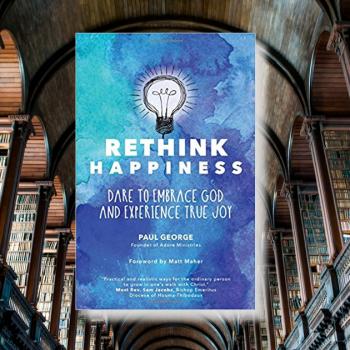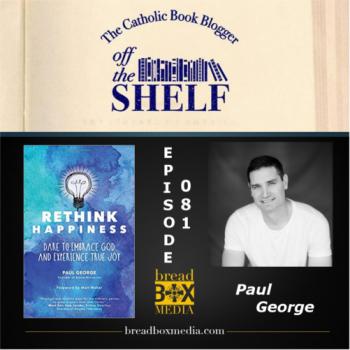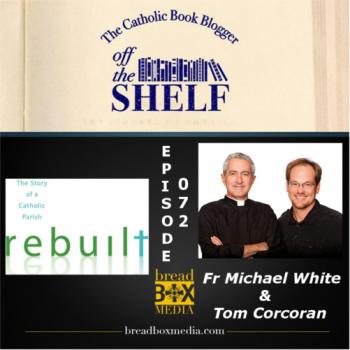 PETE: Before discussing your book Sacred Reading: The 2016 Guide to Daily Prayer, can you tell us a little about your group The Apostleship for Prayer and your role in it?
PETE: Before discussing your book Sacred Reading: The 2016 Guide to Daily Prayer, can you tell us a little about your group The Apostleship for Prayer and your role in it?
DOUGLAS LEONARD: The Apostleship of Prayer was invited by Ave Maria Press to author this series of prayer experiences (lectio divina) in response to the daily Gospels throughout the liturgical year. I consented to be the author of this series because the editors at Ave Maria Press were familiar with my work editing several other books they have published. I am the executive director of the Apostleship in the U.S., under Fr. James Kubicki, SJ, the national director.
The Apostleship of Prayer, founded in France in 1844, is a Jesuit service to the whole Church. Members number over 50 million worldwide, making it the world’s largest prayer network. Its international office is in Rome, and its leader is Father General of the Society of Jesus, Fr. Adolfo Nicolás. The simple, profound spirituality of the Apostleship of Prayer is to offer oneself to God each day, in union with the offering of Christ who offers himself every day in the Mass, for the good of the world, the Church, and the monthly prayer intentions of the Pope. For over a century, popes have entrusted to the Apostleship of Prayer their prayer intentions, asking the Apostleship to publish them and encourage Christians everywhere to pray for them. We are motivated in this cause by the love of the Sacred Heart of Jesus.
PETE: What is the intent of the book Sacred Reading: The 2016 Guide to Daily Prayer?
DOUGLAS LEONARD: My book seeks to deepen the encounter with Jesus Christ for anyone who uses it. Jesus Christ, the Word of the Father, is never more present in the Scriptures than in the Gospels. Read in the presence of the Holy Spirit, the Gospels have the power to illuminate our minds, hearts, souls, and spirits with the Light of Christ. My book intends to draw the reader into a holistic spiritual experience, rather than just an intellectual understanding of the Gospel.
PETE: In saying that, what makes your book different from other daily readers available?
DOUGLAS LEONARD: This book is not a book of reflections on or interpretations of the Gospels. It is a prayerful response to the reading experience with the Gospels. I am trying to lead the reader to move beyond my prompts and read the Gospel of the day as the Spirit leads. I don’t want to pray for the reader; I want the reader to do his or her own praying far beyond what I initiate. This book as just a way to get the reader started. This method of praying with Scripture is based on the spiritual practices and insights taught by St. Ignatius Loyola, the founder of the Jesuits.
- One begins by realizing he or she is in the presence of God who is eager to speak to the reader. God calls us to prayer; we cooperate.
- One reads the day’s Gospel, preferably more than once, using one’s imagination to flush out the scene–staying open to the Holy Spirit, the Author.
- One notices what the Holy Spirit brings most to one’s attention—an image, a word, a character, a question, an anxiety, an emotion, an insight. You want to find that single nugget.
- Focusing on that one thing, one prays, seeking to pray in an authentic way guided by the Spirit, for the Spirit prays through us. Since prayer is a ministry to others as well as ourselves, one seeks to intercede for those God has lain upon one’s heart.
- Having prayed, one now listens to what God is saying. This takes faith, but Jesus said my sheep hear my voice, and Christians have been hearing and recording the words of the Lord to them for two millennia. I recommend writing down the words of the Lord (and perhaps your own prayer as well) and to keep a spiritual journal of what the Lord says to you personally each day. Such a journal may prove to be priceless to you and even to your heirs.
- Continue in dialogue with God as long as the Spirit is with you. Do not end your prayer time without asking God to remain with you and to show you how to live today. Prayer should have enduring impact in our lives.
This whole exercise is to help us truly to live our faith, which is a relationship with Jesus, in our daily lives.
PETE: Sacred Reading draws heavily from the practice of lectio divina. Can you explain to readers unfamiliar what exactly that is?
DOUGLAS LEONARD: Lectio divina is simply Latin for sacred reading. Lectio divina has been practiced ever since there was Scripture. The writers of Scripture themselves, Old Testament as well as new, engage in prayerful reading over passages of Scripture. In short, lectio divina is simply responding to Scripture passages with prayer—and there are many, many ways to do that. People also practice lectio divina with writings that are not Scripture, for example, The Imitation of Christ, by Thomas a Kempis. Next to the Bible, that book is the most popular devotional ever written. Just as there are no limits on prayer, there is no limit on lectio divina.
PETE: Why is a solid prayer life important to Catholics today and how can lectio divina help?
DOUGLAS LEONARD: Being a Christian transcends knowledge and even faith. Becoming a Christian puts us in blessed relationship with God—Father, Son, and Holy Spirit. We place ourselves in the fold of the Good Shepherd, who loves us, protects us, and speaks to us. He promises to be with us always. Becoming a Christian also puts us in blessed family with all other followers of Christ, living and dead. We are members of a holy family. We learn this from Scripture. We know this through the Holy Spirit. And we communicate with God through prayer. Apostles of Prayer seek to make their whole day and act of prayer. Everything we think, do, and say—everything we enjoy or suffer—is offered to God as prayer for others, because the needs of the world are so great. Prayer makes everything possible, for all things are possible with God. To pray is to align our hearts with the Heart of Christ. My book strives to give the reader a cumulative experience of meeting Jesus simultaneously in the Gospel and in prayer. I say cumulative because that relationship with Jesus, like any other relationship, grows every day just through the daily conversation we call prayer.
PETE: Time for my signature ending question. This is a blog about books. What books are currently on your bookshelf to read?
DOUGLAS LEONARD: I just started The Fulfillment of All Desire by Ralph Martin. I recently reread Jesus of Nazareth by Pope Benedict XVI. Before that, I read a newer translation of Imitation of Christ, which never fails to disrupt my life in a good way. I am wanting to read some medieval women mystics, like Julian of Norwich, but I haven’t found the book yet. I bet you have some recommendations for me. Thank you.
___________________________________________________________________________________________











